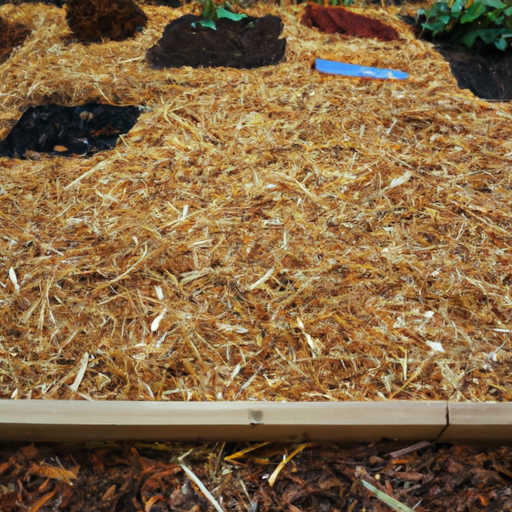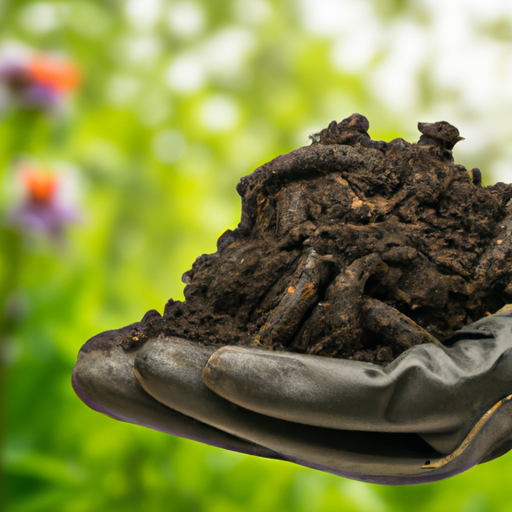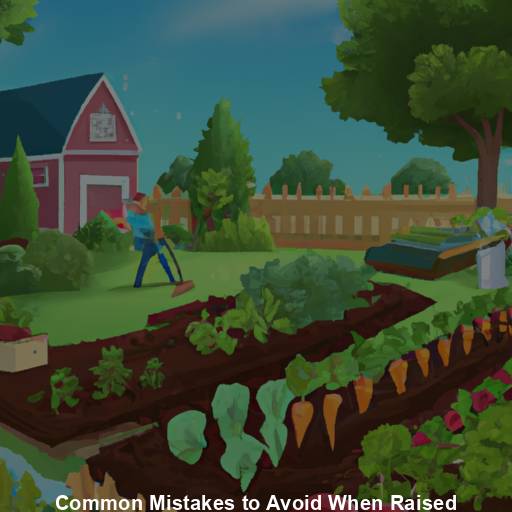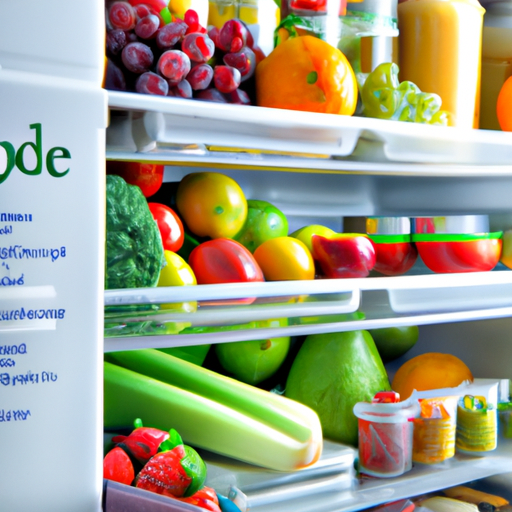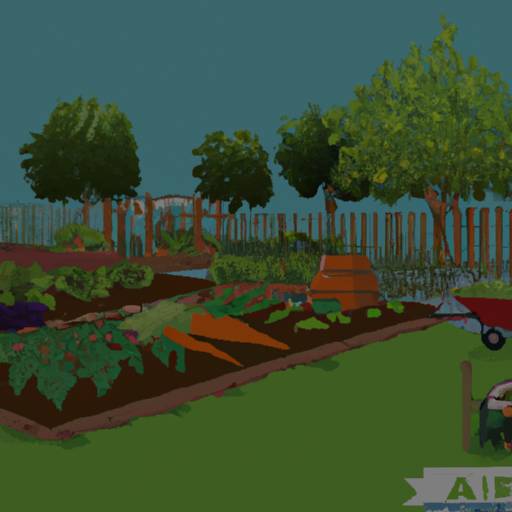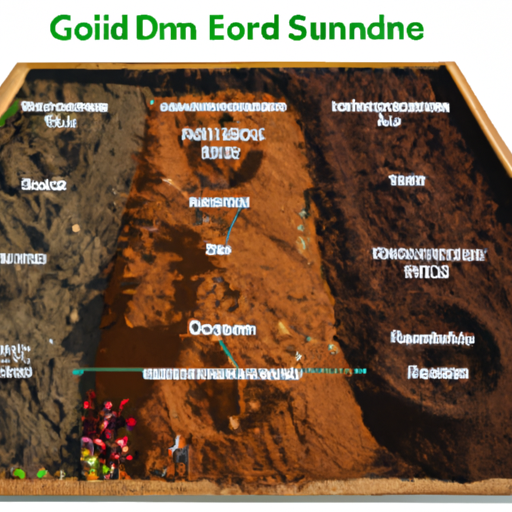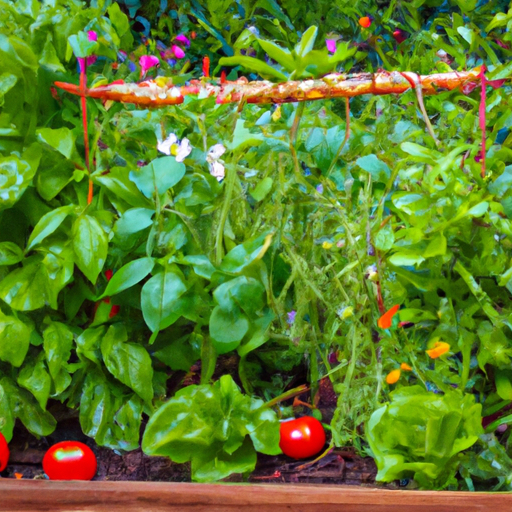As a Master Gardener, I understand that choosing the right mulch for your vegetable garden is crucial to its success. Mulching not only helps regulate soil temperature and moisture levels but also suppresses weed growth, reduces erosion, and improves overall soil health.
With so many options available on the market today, it can be overwhelming to know which one to choose. In this article, we will explore some of the most popular types of mulches used in vegetable gardening and discuss their pros and cons.
Firstly, organic mulches such as straw, grass clippings, leaves or compost are great choices because they break down over time, adding valuable nutrients back into the soil. They also improve water retention by slowing evaporation from the soil surface during hot weather conditions. However, these types of mulches may attract pests like rodents or slugs if not applied correctly.
Conversely, synthetic materials like black plastic or landscaping fabric offer better weed suppression but do not provide any nutrient value nor foster healthy microbial activity in the soil. Ultimately, the best choice depends on personal preference and specific growing conditions within your garden.
Let’s dive deeper into each option and learn how you can make an informed decision when selecting a mulch for your vegetable garden.
Understanding The Benefits Of Mulching
As a Master Gardener, it’s important to understand the benefits of mulching in your vegetable garden.
There are various types of mulching techniques available, but they all serve the same purpose: to improve soil moisture retention.
Mulch acts as a protective layer over the soil, preventing water from evaporating too quickly and keeping it readily available for plants’ roots to absorb.
This can be especially beneficial during hot summer months or periods of drought when irrigation may not be enough to keep your vegetables healthy.
By incorporating mulching into your gardening routine, you’ll not only conserve water but also reduce weed growth and promote overall plant health.
So don’t hesitate to try out different types of mulch such as straw, leaves or even grass clippings – your veggies will thank you!
Organic Mulches: Pros And Cons
Now that we understand the benefits of mulching, let’s dive into the pros and cons of organic mulches.
Organic mulches are made from natural materials such as leaves, straw, grass clippings, and compost. They break down over time, adding nutrients to the soil and improving its structure. However, they also require more frequent application than inorganic mulches like rocks or plastic.
When choosing an organic mulch for your vegetable garden, consider factors such as how well it retains moisture and how quickly it breaks down. To ensure successful application of your chosen mulch material, follow these techniques:
– Apply a layer 2-4 inches thick
– Keep at least 1 inch away from plant stems
– Reapply when necessary (usually once per growing season)
– For best results, apply after watering or rainfall
– Mix with other organic matter to improve soil health
As a Master Gardener, I highly recommend using organic mulches in your vegetable garden for their many benefits. With proper application techniques and thoughtful consideration of which materials to use, you can create a healthy and thriving environment for your plants to grow.
Remember to always monitor the condition of your garden bed throughout the growing season and adjust your mulching strategy accordingly!
Synthetic Mulches: Pros And Cons
Did you know that synthetic mulches are becoming increasingly popular in vegetable gardens? According to a recent survey, 35% of gardeners now use some form of synthetic mulch. While there are advantages to using synthetic mulches, such as their ability to suppress weeds and conserve moisture, there are also disadvantages. For example, they can be more expensive than organic mulches and may not break down naturally over time.
To help weigh the pros and cons of synthetic mulches, here is a table comparing them to other types of mulch:
| Type of Mulch | Advantages | Disadvantages |
| — | — | — |
| Synthetic | Suppresses weeds, conserves moisture | More expensive, does not break down naturally |
| Organic (e.g. straw) | Adds nutrients to soil as it breaks down, inexpensive | May attract pests or weed seeds |
| Living (e.g. cover crops) | Improves soil health, provides habitat for beneficial insects | Requires upkeep and management |
As with any gardening decision, it’s important to consider what works best for your individual needs and preferences. If you’re looking for long-lasting weed suppression and don’t mind investing in materials upfront, synthetic mulches could be a good option for you. On the other hand, if you prioritize budget-friendliness or want to add natural nutrients back into your soil over time, organic or living mulches might be worth considering instead.
Other Types Of Mulches To Consider
Now that we’ve explored the pros and cons of synthetic mulches, let’s take a look at some other options to consider for your vegetable garden.
One great choice is composting mulch, which not only adds nutrients to your soil but also helps reduce waste. Simply spread a layer of compost over your garden beds and watch as it breaks down into rich organic matter.
Another option to consider is decorative mulch, such as bark chips or stones. While they may not provide as many benefits for your soil as other types of mulch, they can add an attractive aesthetic element to your garden. Keep in mind that decorative mulch may require more maintenance than other types, so be prepared to occasionally rake or replace it.
To help you make the best decision for your specific garden needs, here are four key factors to consider when choosing a mulch:
1) Climate: Certain types of mulch perform better in different climates, so choose one that will thrive in yours.
2) Soil type: Consider the pH levels and moisture retention abilities of your soil when selecting a mulch.
3) Availability: Some types of mulch may be easier to find locally than others.
4) Budget: Mulching can get expensive quickly depending on the size of your garden, so make sure you choose an affordable option.
By taking these factors into account and exploring all the available options—including composting and decorative mulches—you’ll be able to select the perfect solution for keeping your vegetable plants healthy and thriving all season long!
Factors To Consider When Choosing The Best Mulch For Your Vegetable Garden
When it comes to choosing the best mulch for your vegetable garden, there are several factors to consider. Mulch not only helps retain moisture in the soil and suppress weeds, but also adds nutrients as it breaks down over time. To make the most of these benefits, you must choose a mulch that is suitable for your specific needs. One important factor is mulch color – dark-colored mulches absorb more heat than light-colored ones, which can be beneficial if you live in cooler climates or want to extend your growing season. However, if you live in hot areas, lighter colored mulches will help keep the soil cool and prevent plants from overheating.
Another aspect to consider when deciding on a mulching routine is application frequency. While some gardeners prefer to apply a thick layer of mulch once per year, others find it more effective to add smaller amounts multiple times throughout the growing season. This allows for better nutrient absorption by the plants while avoiding issues with excessive water retention or plant suffocation.
To help determine which type of mulch is right for you and your garden’s needs, take a look at this table:
| Type | Pros | Cons |
| — | — | — |
| Straw | Inexpensive and readily available; promotes good air circulation around plants | Can harbor weed seeds; may attract rodents |
| Wood Chips/Shavings | Long-lasting; adds organic matter as it decomposes | May require nitrogen supplementation due to high carbon content |
| Grass Clippings | Free source of nitrogen-rich fertilizer; reduces landfill waste | Can mat together and impede water/nutrient flow |
| Leaves | Easy-to-source (especially in fall); improves soil structure and drainage | Breaks down quickly without additional materials added |
| Plastic Sheet Mulch Highly effective at suppressing weeds; conserves moisture well Not biodegradable; requires careful installation/removal |
As always with gardening advice, it’s important to experiment and see what works best for your individual situation. By taking factors like mulch color and application frequency into account, you can help ensure a bountiful harvest year after year.
Frequently Asked Questions
Can I Use The Same Type Of Mulch For All Of My Vegetable Plants?
Using the same type of mulch for all your vegetable plants may not be the best idea.
Mulch compatibility and plant specific mulch selection are crucial factors to consider when it comes to maintaining a healthy garden.
Some vegetables thrive in certain types of mulch, while others may not do well with that same material.
It’s important to research which type of mulch works best for each individual plant, taking into account their unique needs such as moisture retention or pest control.
As a Master Gardener, I advise against using a one-size-fits-all approach in terms of mulching your vegetable garden.
By selecting the right mulch for each type of plant, you’ll ensure optimal growth and production throughout your entire garden.
How Often Should I Replace The Mulch In My Vegetable Garden?
Replacing mulch in your vegetable garden is a vital task that cannot be ignored. The benefits of mulching are numerous, but when the signs of wear and tear start showing up, it’s time to replace!
Mulch helps retain moisture, suppress weeds, control soil temperature, and protect roots from extreme weather conditions. However, when you notice the color fading or smell anything unpleasant from your existing layer of mulch, it could indicate fungal growth or insect infestation.
In such cases, replacing the old with fresh new layers will keep your veggies healthy and thriving. Always remember- timely replacement ensures maximum yield potential for your vegetable plants!
Can I Use Colored Mulch In My Vegetable Garden?
Colored mulch can be a beautiful and eye-catching addition to your vegetable garden, but it does come with some potential drawbacks.
While colored mulch can help retain moisture in the soil and suppress weeds, it may also contain chemicals that could leach into the ground over time.
Additionally, if you’re using organic methods for pest control in your garden, colored mulch may attract fewer beneficial insects than natural options like straw or shredded leaves.
However, there are alternative types of mulch that you might consider instead, such as compost or bark chips.
Ultimately, the decision to use colored mulch in your vegetable garden will depend on your personal preference and gardening goals.
Will Mulching My Vegetable Garden Attract Pests?
While mulching your vegetable garden is necessary to keep the soil moist and prevent weeds from growing, it’s important to choose the right kind of mulch.
Using natural alternatives such as straw or leaves can help prevent pest infestations in your garden.
Avoid using colored mulch or dyed wood chips as they may contain harmful chemicals that could harm both plants and beneficial insects.
Additionally, avoid using fresh grass clippings as they can attract pests like slugs and snails.
By being mindful of what type of mulch you use, you can create a healthy environment for your vegetables that won’t attract unwanted visitors.
Can I Mix Different Types Of Mulch In My Vegetable Garden?
Mixing different types of mulch in your vegetable garden can actually have many benefits. By combining various materials, you can create a more nutrient-rich and diverse environment for your plants to grow in.
One tip for properly layering different types of mulch is to start with a base layer of coarse material, such as wood chips or straw, followed by a finer layer like compost or leaf mold.
This will allow for better water retention and soil structure while still providing the necessary nutrients for healthy plant growth. So don’t be afraid to mix it up when it comes to mulching your garden!
Conclusion
In conclusion, choosing the best mulch for your vegetable garden depends on a variety of factors. While some types of mulch may work well for one plant, they may not be suitable for another.
It’s important to research and experiment with different types of mulch to find what works best for you and your specific plants.
As a Master Gardener, I recommend trying out organic materials like straw or grass clippings as these provide nutrients to the soil over time.
And don’t forget about the benefits of allusion – just like how plants need water and sunlight to thrive, our writing needs engaging elements like allusions to keep readers interested.
So go ahead and sprinkle in some literary references or nods to pop culture while discussing your favorite type of mulch – it’s sure to make for a more enjoyable read!
